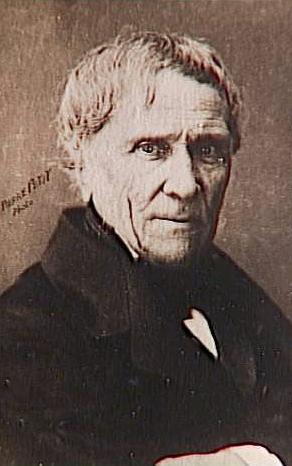Antoine César Becquerel facts for kids
Quick facts for kids
Antoine César Becquerel
|
|
|---|---|
 |
|
| Born | 7 March 1788 Châtillon-Coligny, Loiret, France
|
| Died | 18 January 1878 (aged 89) |
| Alma mater | École Polytechnique |
| Known for | Differential Galvanometer |
| Awards | Copley Medal |
| Scientific career | |
| Fields | Electricity, Electrochemistry |
| Institutions | École Polytechnique Muséum National d'Histoire Naturelle |
| Notes | |
|
Note that he is the father of A. E. Becquerel, and the grandfather of Henri Becquerel.
|
|
Antoine César Becquerel (born March 7, 1788 – died January 18, 1878) was a French scientist. He was a pioneer in studying electricity and how things glow (called luminescence). His work helped us understand more about how electricity works and how it can be used.
Contents
Early Life and Career
Antoine César Becquerel was born in a town called Châtillon-sur-Loing, which is now known as Châtillon-Coligny. He studied at a famous school called the École Polytechnique.
After finishing school, he became an engineer-officer in 1808. He served in the army in Spain from 1810 to 1812. He also served in France in 1814. After his military service, he decided to leave the army. He then spent the rest of his life doing scientific research.
Discoveries and Inventions
Becquerel made many important discoveries and inventions. He was especially interested in electricity and electrochemistry. This is the study of how electricity and chemical reactions are connected.
Understanding Electricity and Materials
In 1820, Becquerel discovered that pressure could create electricity in many materials. He thought this happened because of how surfaces interacted. This was an important step in understanding how different materials behave with electricity.
Tools for Measuring Electricity
In 1825, he invented a special tool called a differential galvanometer. This device helped scientists measure electrical resistance very accurately. Resistance is how much a material opposes the flow of electricity.
Later, in 1829, he invented an electrochemical cell. This was a type of battery that could produce a steady electric current. It was an early version of what we now know as the Daniell cell.
The Photovoltaic Effect
In 1839, Antoine César Becquerel worked with his son, A. E. Becquerel. Together, they discovered the photovoltaic effect. This is how some materials can create electricity when light shines on them. They observed this effect on an electrode placed in a liquid that conducts electricity. This discovery is super important because it's the basic idea behind how solar panels work today!
Using Electricity to Create Metals
Becquerel was also the first scientist to create metallic elements from their ores using electrolysis. Electrolysis is a process that uses electricity to cause chemical changes. He hoped this method would help us understand how natural minerals form in the Earth.
Later Life and Legacy
In 1837, Antoine César Becquerel became a member of the Royal Society in London. He also received the Copley Medal. This is a very important award for his work on electricity.
He also studied how animals create heat and how plants grow. He spent a lot of time observing weather patterns too. He wrote many books and papers about his scientific findings.
From 1837, he was a professor of physics in Paris. He taught at the Muséum National d'Histoire Naturelle. He passed away in Paris in 1878.
A Family of Scientists
Antoine César Becquerel came from a family of famous scientists.
- He was the father of physicist A. E. Becquerel.
- He was the grandfather of physicist Henri Becquerel. Henri Becquerel discovered radioactivity. The unit for radioactivity, the becquerel (Bq), is named after him.
- He was also the great-grandfather of Jean Becquerel.
His last name is one of the 72 names written on the Eiffel Tower in Paris. This shows how important his contributions to science were!
See also
 In Spanish: Antoine César Becquerel para niños
In Spanish: Antoine César Becquerel para niños
- List of works by Eugène Guillaume
- A. E. Becquerel (his son)
- Henri Becquerel, (his grandson)
- Jean Becquerel (his great-grandson)
Images for kids
 | Delilah Pierce |
 | Gordon Parks |
 | Augusta Savage |
 | Charles Ethan Porter |


